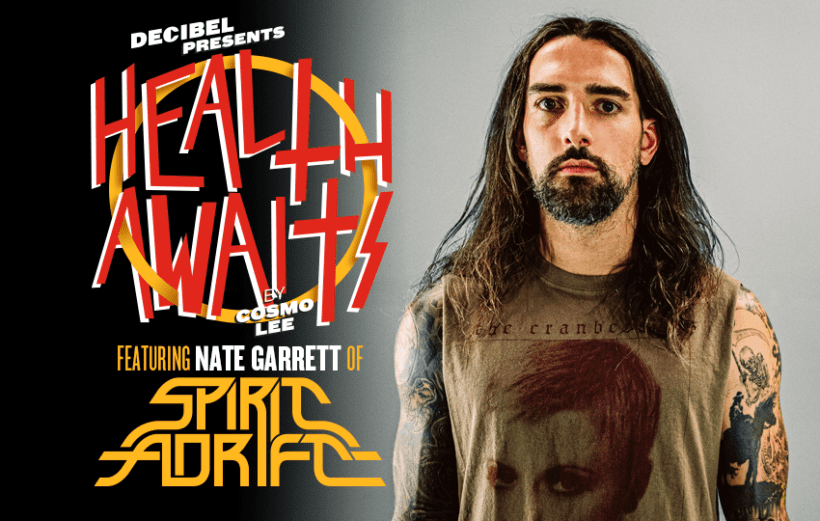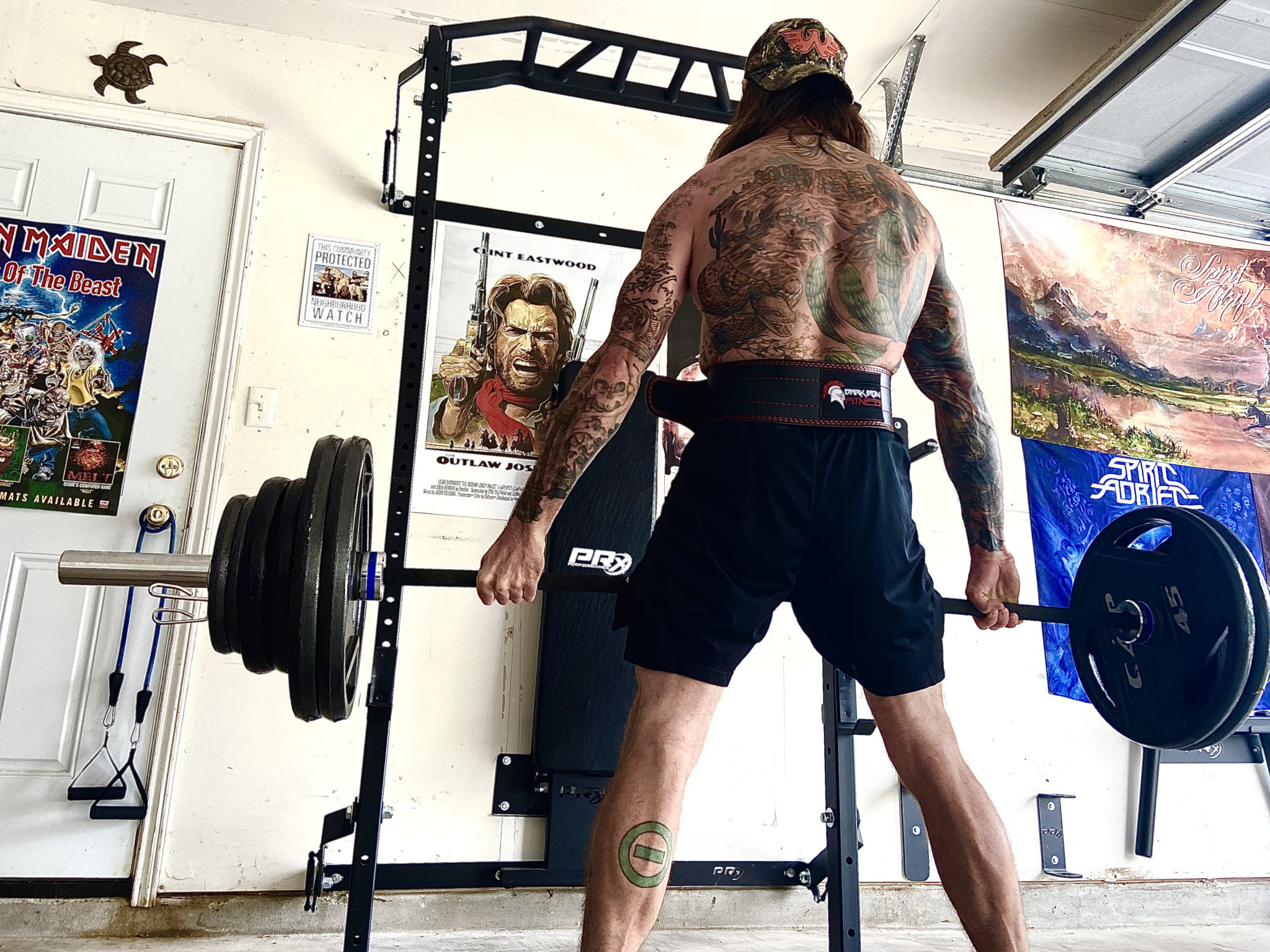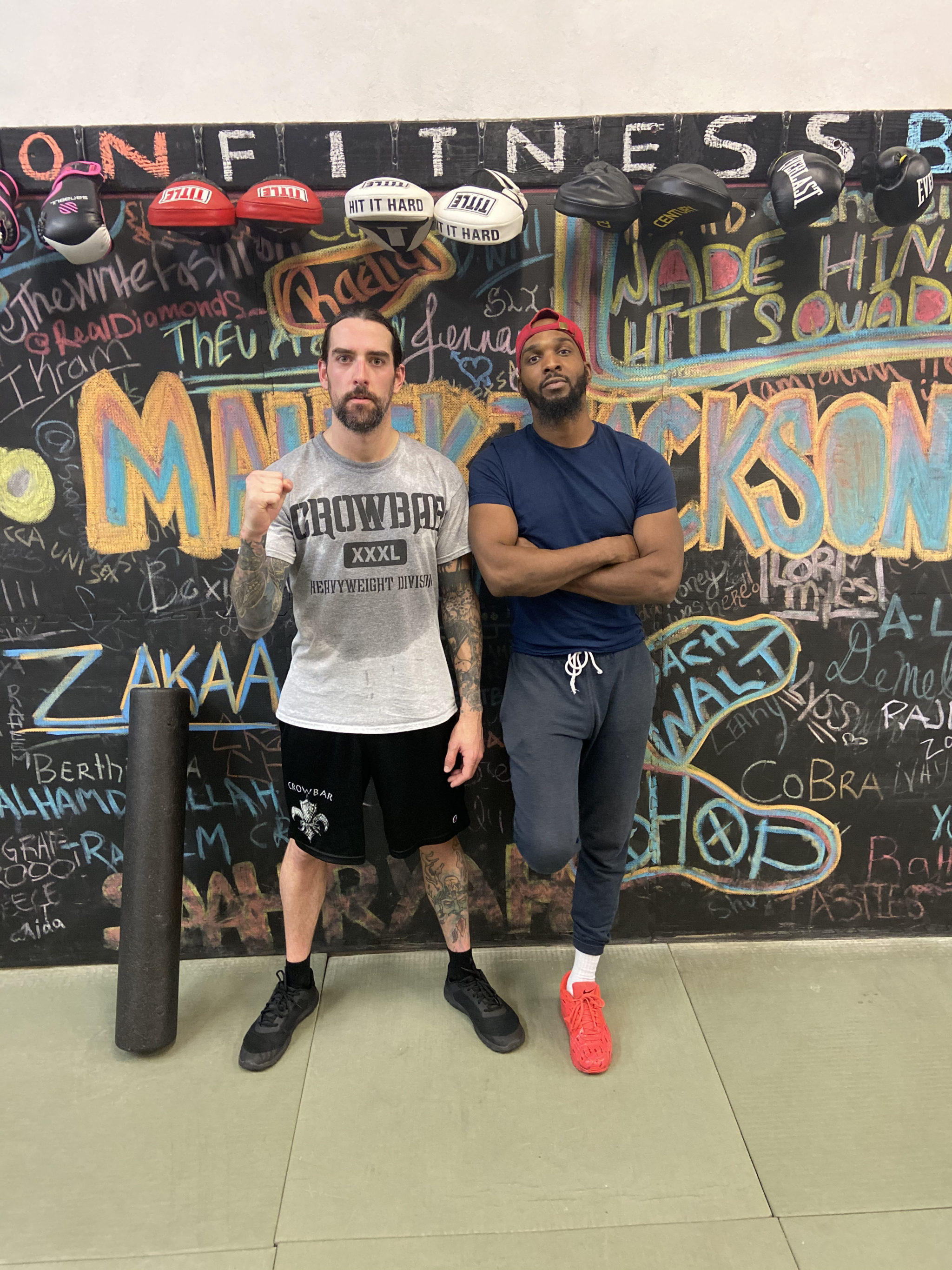
Nate Garrett (Spirit Adrift, ex-Gatecreeper) is a survivor. We’re all survivors of something, but Garrett’s something was as big as it gets, a 15-year bout with alcoholism that left him at death’s door. At the brink, he chose to live.
Living is a struggle, and out of struggle comes strength. Today Garrett is in top shape and writing music nonstop. He tells us how he got this far, and what he does to stay on the straight and narrow.
(A good companion to this interview is BJ Fogg’s book Tiny Habits: The Small Changes That Change Everything, which teaches techniques for things Garrett mentions, such as starting out small and replacing bad habits with good ones.)
Given the epidemic, let’s start out with mental fitness. Do you “work out” in that way?
The primary reason I work out physically is for the mental effect. One of the main things I’m trying to mitigate by working out so much is the latent rage that I have. I guess it’s from traumatic events in my life. It takes a lot to get me to the point that I get extremely angry. But when I do, it’s really bad.
My anxiety is at an all-time low. I’ve always struggled with anxiety so bad to the point that it would give me insomnia, and I would have panic attacks. I can’t actually remember the last time I had a full-blown panic attack. So I’m doing really good, man. I mitigate all that stuff with physical activity, writing music, staying busy with music, reading. I’m getting really into stoicism. I’m getting better and better at practicing that, day to day.
The drug and alcohol recovery work that I do every day – that helps immensely. I’ve found a new group of guys that I’ve been hanging with on Zoom that’s awesome. I do it every morning. It’s a multi-tiered approach. That shit can sneak up on you. No one thing for me is going to fix my mental issues. I have to stay fluid and vigilant with it.
Tell me about the morning work.
I found that during this whole [pandemic], routine has been awesome for me. I’ve been doing sun salutation for a really long time. It gets your breathing going. It centers you in the morning, stretches everything out. And then I’ll walk the dogs. It’s kind of a core workout because they’re really strong, and they pull because they’re still puppies. Then I get home, and at the same time every morning, I meet with the group of guys.
Again, it’s about centering yourself. It’s about being vigilant about your thoughts. Your thoughts begin to dictate your actions, which begin to dictate your habits, which over the course of weeks and months and years—then that’s your life. Your thoughts become your actions become your habits become your life. Your life is essentially habit on a long enough timeline. The key is breaking bad habits or reducing bad habits and increasing good habits.
When you got sober, did you stop one big habit cold turkey, or did you gradually stop small habits?
The gradual thing didn’t work for me, and I don’t think that works for a true alcoholic. My drinking career was about 15 years. I started when I was 12 or so, stopped when I was 27. Throughout that drinking career, there were countless times that I was like, “I’m going to stop.” But stopping forever never seemed possible or appealing in any way. The first time I got drunk, I was like, “I’m going to die drunk, because this fixes everything wrong with me, and it’s worth it to live a shorter life and die a horrible death if I get to be drunk every day and all of my problems are solved.” But the problem is, eventually you find out that dying a physical death from alcoholism is not good. It’s not quick. It doesn’t just end. It’s really shitty.
Your situation had a name, alcoholism and drug addiction is its sibling. But I would argue that most people have something similar. It just doesn’t look as dire. Maybe one is trapped in a bad relationship or in a job from which one needs money. What would be your advice to people wanting to drop that monkey off their back?
You just have to recognize the internal window of opportunity for action. It might take years for that to come. For the last two or three years of my drinking, I didn’t want to do it. I was trapped. And, yeah, it’s not just drugs or alcohol that can convince you that you need them. But I think we all have an internal gauge for our true selves and our true purpose and our true path to serenity and peace in this life. It’s been called different things by different people. Crowley calls it the holy guardian angel, our truest version of ourselves that’s connected to our purpose in this life.
Any day that you wake up could be the day that you are given whatever chemical reaction in your head that creates some kind of mood or some perspective shift where you say, “Fuck it, today is the day that this ends.” You don’t have to change your whole life in that moment. It’s corny, but you just take one step. Like Harley Flanagan, whom you just spoke to, said, if you’re sitting watching Netflix, get down and do a few pushups. And don’t feel bad if you can only do five pushups, or one or zero. And then just do that the next day, again.
Dude, six years ago, I was dying. I was basically in a state of paranoid schizophrenia. I had drunk myself into a complete mental illness that I didn’t even know was in me, or that I didn’t even know it was possible for me to experience. My internal organs were failing. I couldn’t eat. All I could do was drink alcohol. And if I stopped drinking alcohol on my own at home, I was going to die. Talk about an impossible condition. I really truly didn’t see a way out of it. I was certain I was going to die miserable and insane. But six years later, I’ve never been happier. And I’m not special. I just took a little bit of action.

Did you pursue fitness when you were a drunk?
Hell no [laughs]. I was too fucked up.
Do you think physical fitness filled the space that alcoholism left?
Yeah, partially, and re-engaging and falling back in love with the stuff I was doing before I got in such bad shape. Falling back in love with listening to music and writing music. Falling back in love with interacting with people. I wasn’t interacting with any people at the end of my drinking at all, except the people in my head that didn’t actually exist.
When I was growing up, I was very active in sports. I always loved doing outdoors stuff. I played baseball for a really long time. I was a really good pitcher. My best friend growing up was a state champion wrestler in Oklahoma and a Golden Gloves boxer. We started a little amateur boxing group between our friends. We would just box each other in the front yard. I started lifting weights in high school. I really dug lifting weights and listening to Carnivore or Black Flag. That stuff always helped me with dealing with trauma and pain in my life, even from an early age.
But when the drinking and craziness took over, all of that stuff took a back seat to the real priority, which was staying out of my mind 24 hours a day, for years. By the end of my drinking, I wasn’t capable of doing anything. I couldn’t even eat. I was weak and dying. I had a terminal condition, and I still treat it to this day.
One of the first things that I did coming out of detox—we went to Target, and I bought running shoes and a pair of shorts. And I just started running, and running, and running. I was running all the time, every day. I think that helped me physically from the damage I’d done to myself. But it also burned up a lot of that obsessive excess energy that had no outlet. Alcohol had been my outlet for all this obsessive, crazy energy. So I wanted to make sure I didn’t just stop that obsession and sit there with no new obsession and no place for that [energy] to go.
After you got sober, you got back into lifting weights. Tell me about that.
The first serious weightlifting memory that I have was two years later, on tour with Cannibal Corpse. Alex Webster—who you should definitely talk to for this, he’s a fitness guy, a big runner—he came out with the sectioned dumbbells from which you can pull out different weights. A couple of guys on the crew busted out a fuckin’ bar and plates and all this stuff. And like I said, when I was 17, 18, I was big on compound lifting, like bench press, squats. But these dudes got me into deadlifting. And I was hooked immediately, to the point that we were doing it every day. And on subsequent tours with Gatecreeper, Eric Wagner and myself would bring a bar and plates and rack, and we would do deadlifts and squats and bench presses every day that we could.
Are Cannibal Corpse putting the rack and weights below the bus?
Yeah, underneath. For us, it was way more of a pain in the ass. There was skepticism from some of the other guys in Gatecreeper at first because we just had a trailer. But it worked out. We figured out a system. We put the plates up in the front corner. We put all the weight stuff in the front of the trailer so that we could unload the gear, bust the stuff out on the street, work out real quick, and put it back. At the end of the night, it’s already in there, out of the way; we put the gear back in and go.
When you say street, you mean next to the venue.
Yeah. We played House of Blues in New Orleans, which is right in the middle of the French Quarter. We had this motherfucker set up on a main street in the French Quarter. We were doing heavy squats, and, man, it was fun. We met some characters doing that, all over the world. In Canada, we had some drunk guy fall into the bar and almost knock it over because he was trying to show us how it was done. In New Orleans, there was this dude from Oklahoma who was a former football coach. He came over and started talking shit to all of us about our technique. I just kept calling him, “Coach”. That was fun. A drug dealer came over and did some squats with us.
When are you doing these workouts before the show?
On the tour that we had all that equipment, it would be after load-in and before doors. On the last Spirit Adrift tour, I would do resistance band stuff and shadowboxing. On the last tour I did with Gatecreeper, I would actually find the closest boxing gym and go fuck around, which was really fun, to see each individual city’s boxing gyms. If I couldn’t find a boxing gym, I would just go to a regular gym and run or lift weights. I did that every day of that tour.

Tell me about staying sober on tour. Obviously, you’re seeing drinking and substance abuse around you.
It might actually make it easier. We run into people that probably shouldn’t be drinking and doing drugs the way that they are. A lot of fellow musicians and fans will talk to me when they’re fucked up about not wanting to be fucked up. So it’s a good reminder.
The program that I’m in, if you do it right, it works. I’ve never seen it not work with somebody that actually puts the effort in and does it. One of the things that happens early on is that the obsession is lifted. No one knows how far into sobriety that will be. But it’s happened to every single person that works the program that I’m in. At one point the obsession was lifted for me. It was well before I went back on tour.
Another thing that helps is seeing people. I know a few people that have kind of followed in my footsteps. There’s people whose footsteps I followed in also. It’s inspiring to see somebody that’s struggling and know that by saving my own life and improving my own life, that it may lay some groundwork for somebody to follow suit. That’s all way better than whatever fleeting experience I would have by getting drunk, which would inevitably ruin my life in the end.
Nita Strauss said that calories count on the road. Would you agree with her?
Yeah. I’m probably more active on tour than at home, despite all the sitting in a van. There’s a lot of walking. I load the gear every single night. I think I might eat more frequently on tour than I do at home. But I try to be super mindful. Thor from Swans wrote that thing about touring years ago, and one of the things he talked about was eating oranges for fiber, or just eating a piece of fruit. And I’m real big on that. You can get an apple and a banana almost anywhere—at a truck stop, in any state.
It’s a mental health thing. I don’t like feeling like shit. And there’s enough stuff on tour that builds up to make you feel like shit that you don’t need to be adding on to it in any way, shape, or form. You’re not going to get the right amount of sleep, which is really difficult for me. I read that a lack of sleep leads to an increase in negative thoughts, and I was like, “Oh, wow, that explains a lot.” I don’t have a capacity for an increase in negative thoughts. On tour, sometimes I’m like, god, I literally want to fucking kill everybody, and I don’t know why. So, I definitely don’t want to exacerbate an already fucked up, twisted brain by eating like shit.
Sometimes you have to. We eat a lot of Taco Bell on tour because I feel like it’s the lesser of the fast food evils. Even if the quality is shit, beans and rice will provide you with some protein and stuff like that. I eat as much fruit and vegetables as humanly possible. I hit grocery stores as much as I possibly can. I like to keep a stock of fruit and vegetables and kombucha. Kombucha is huge. I drink that stuff every day if I can.
What does it do for you?
Part of it is that it burns my throat and my esophagus in the same way that whiskey did, which is really nice. It just makes me feel good. It makes my blood feel a little on fire. I joke that it’s like a microdose of alcohol. I’ve been drinking kombucha since I got sober, and it hasn’t led to anything bad happening, so I think it’s OK.
What’s your diet like at home?
Pretty good. I’m not that strict on anything. My wife works for Whole Foods, so she’ll bring home good groceries. We do a lot of smoothies and fruit in the morning, usually some kind of chicken thing for lunch, just basically experimenting with all the different ways you can eat chicken. Lots of rice and veggies and stuff like that. We’ll plan a meal out where we’ll go fucking insane. But for the most part, simple meals at home.
Where do you get health and fitness cues from?
Right after I got sober, I started listening to the Joe Rogan podcast. I really enjoy it, man. I do get some of it from following MMA fighters. I’m really, really obsessed with MMA and boxing, more so MMA these days. David Goggins—when I found out about that guy, I started religiously following him.
Tell me about stoicism. What have you been reading?
A couple years ago I read Marcus Aurelius’ Meditations, which is kind of *the* book for stoicism. Before that, Marcus [Bryant, Spirit Adrift drummer] gave me the Tao Te Ching, which is proto-stoicism in certain ways. Most recently, I went and got Ryan Holiday’s books. There’s three of them. I read all three of them real quick. They’re almost like “Stoicism for Dummies,” and I don’t mean that as an insult at all. I think he would probably agree with that. I’m going to keep reading, because I like it a lot. Also, the recovery program I’m in, it’s an amalgamation of a lot of different things, but it draws heavily from stoicism. It took me a while to realize that. I think that’s where it started creeping into my life, through recovery.
For working out at home, what do you have, and what do you do?
I have a—I think PRx is the company—it’s a foldout rack. And I got a foldout bench in the garage. I do squats and overhead press, pullups, deadlifts, any sort of super-heavy compound lifting out there. We have a workout room which is more where my wife does her thing. I have an Aqua Bag in there, which is great. It’s just a big bag filled with water that you punch. So I work on my boxing in there. We have kettlebells and that sort of thing.
Do you write out your reps and sets?
It’s just kind of based on how I feel. I keep a loose track in the back of my mind about not doing anything two days in a row. If I feel like I’m good to go, I’ll do something. And if I feel like I should do something else, I do something else. If I feel like I should go run three miles, I’ll do that. If I feel like I’m slow, I’ll go do something that doesn’t require dynamic muscle movements, like I’ll go deadlift or something. If my back is hurting, I’ll do pull-ups and try to stretch my spine out a little bit. I don’t really adhere to anything all that tight. What I do is I make sure that I’m doing whatever I need to do every day to maintain consistency and discipline and also my mental health.
How do you handle rest and recovery?
Unfortunately, I don’t rest or recover enough. I keep saying I’m going to start doing yoga and stuff, but I really don’t do it. I went back to Arizona for a week to record an EP that we just did, and I didn’t do any working out for a week. And I was amazed at how good I felt. Because of the fact that my primary motivator for going so hard physically is to mitigate my mental issues, I don’t like to rest. When I rest, I sit there and I think.

Maybe recording filled that space for that week.
It did 100%, yeah. A lot of people don’t realize that thinking and mind activity burns calories. It literally burns energy. So, you can sit and be working on a record for 12 hours a day, and you’re not doing anything crazy, you’re not lifting anything heavy, your heart rate’s not being accelerated—by the end of the day, you feel physically exhausted, not just mentally exhausted. It’s because your brain is on overdrive.
Would you draw any connection between physical performance and musical performance?
I know that the more in shape I am, the better I sing. Singing is a very physical activity. And, playing, too. You just have more stamina. There’s a definite connection there, absolutely.
It helps to look good on stage, too.
Yeah, that’s important, I guess. One thing that I do keep in mind is, depending on what’s coming up in my musical life, I might change what I’m doing with my workout routine. So, knowing that I’m going to have to sing, I might start powerlifting less and running more to lean more into the cardiovascular training and be a little more light feeling with my muscles.
For someone who’s starting from ground zero and has been sitting on the couch and eating badly, what’s your advice to them?
If you want to change bad enough, just take that first step. If I could get out of the hole that I was in, anyone can do it. It might seem impossible, and I know that it’s easier to just sit and stew and wish that things were a certain way. But all you have to do is start. It’s going to take a while. Like I said early on, it’s all about habit. You just set a goal, and you work at it every day, every single day, just a little bit.
I was addicted to drinking whiskey. All I wanted to do was drink whiskey, that’s it. Now I’m addicted to stuff that’s not only not killing me, but actually improving my health. That just came over time and repetition and forming a new habit. One day you’ll look back and be amazed at what happened.







